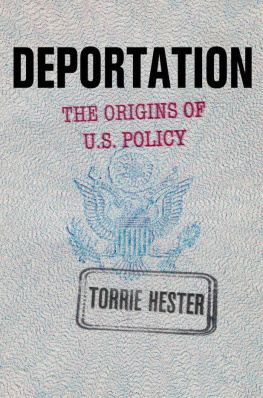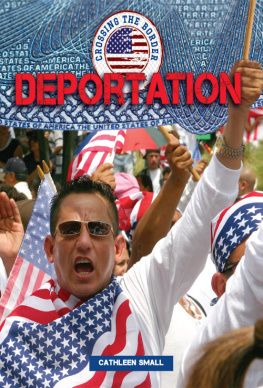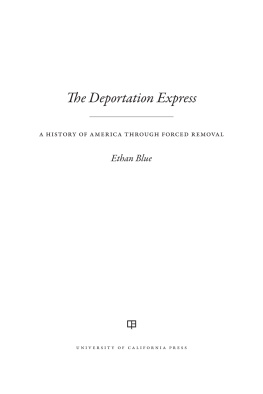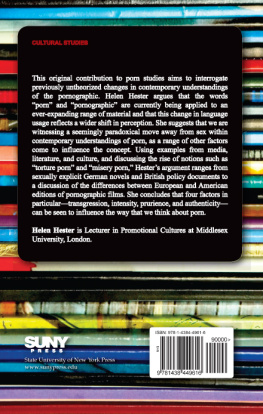Torrie Hester - Deportation: the origins of US policy
Here you can read online Torrie Hester - Deportation: the origins of US policy full text of the book (entire story) in english for free. Download pdf and epub, get meaning, cover and reviews about this ebook. year: 2017, publisher: University of Pennsylvania Press, Inc., genre: Politics. Description of the work, (preface) as well as reviews are available. Best literature library LitArk.com created for fans of good reading and offers a wide selection of genres:
Romance novel
Science fiction
Adventure
Detective
Science
History
Home and family
Prose
Art
Politics
Computer
Non-fiction
Religion
Business
Children
Humor
Choose a favorite category and find really read worthwhile books. Enjoy immersion in the world of imagination, feel the emotions of the characters or learn something new for yourself, make an fascinating discovery.
- Book:Deportation: the origins of US policy
- Author:
- Publisher:University of Pennsylvania Press, Inc.
- Genre:
- Year:2017
- Rating:3 / 5
- Favourites:Add to favourites
- Your mark:
- 60
- 1
- 2
- 3
- 4
- 5
Deportation: the origins of US policy: summary, description and annotation
We offer to read an annotation, description, summary or preface (depends on what the author of the book "Deportation: the origins of US policy" wrote himself). If you haven't found the necessary information about the book — write in the comments, we will try to find it.
Deportation: the origins of US policy — read online for free the complete book (whole text) full work
Below is the text of the book, divided by pages. System saving the place of the last page read, allows you to conveniently read the book "Deportation: the origins of US policy" online for free, without having to search again every time where you left off. Put a bookmark, and you can go to the page where you finished reading at any time.
Font size:
Interval:
Bookmark:
DEPORTATION
DEPORTATION

THE ORIGINS OF U.S. POLICY
TORRIE HESTER

UNIVERSITY OF PENNSYLVANIA PRESS
PHILADELPHIA
Copyright 2017 University of Pennsylvania Press
All rights reserved.
Except for brief quotations used for purposes of review or scholarly citation, none of this book may be reproduced in any form by any means without written permission from the publisher.
Published by
University of Pennsylvania Press
Philadelphia, Pennsylvania 19104-4112
www.upenn.edu/pennpress
Printed in the United States of America
on acid-free paper
1 3 5 7 9 10 8 6 4 2
A Cataloging-in-Publication record is available from the Library of Congress
ISBN 978-0-8122-4916-3
Contents

Abbreviations

AR-CGI | U.S. Department of Labor, Bureau of Immigration, Annual Report of the Commissioner General of Immigration (Washington, D.C.: Government Printing Office, 18941924). |
CAN | Immigration Branch, RG 76, National Archives of Canada, Ottawa, Ontario. |
CCF-AZ | Criminal Case Files, 18691911, Arizona Territorial Court, Third Judicial District, Records of the District Courts of the United States, RG 21, National Archives, Pacific Region, Laguna Niguel, Calif. |
CCF-CA | Criminal Case Files, 19071929, Southern District of California, Southern Division (Los Angeles), Records of the District Courts of the United States, RG 21, National Archives, Pacific Region, Laguna Niguel, Calif. |
ChEx-AZ | Chinese Exclusion Case Files, 18971911, Arizona Territorial Court, Fourteenth Judicial District, Records of the District Courts of the United States, RG 21, National Archives, Pacific Region, Laguna Niguel, Calif. |
DF | Central Decimal File Subjects 19101949, Central Files 1910January 1963, U.S. Department of State Records, RG 59, National Archives, College Park, Md. |
DS | Diplomatic Correspondence, Central Files of the Department of State, 17781963, RG 59, National Archives, College Park, Md. |
FRUS | U.S. Department of State, Foreign Relations of the United States (Washington, D.C.: U.S. Government Printing Office, 18861924). |
FSP | Records of the Foreign Service Posts of the Department of State, State Department and Foreign Affairs Records, RG 84, National Archives, College Park, Md. |
ILR | U.S. Department of Labor, Bureau of Immigration, Immigration Laws and Rules (Washington, D.C.: U.S. Government Printing Office, 19071924). |
INS | Records of the Immigration and Naturalization Service, RG 85, National Archives, Washington, D.C. |
USC-AZ | U.S. Commissioners Dockets and Minutes, 18911912, Arizona Territorial Court, Third Judicial District, Records of District Courts of the United States, RG 21, National Archives, Pacific Region, Laguna Niguel, Calif. |
USSCRB | U.S. Supreme Court Records & Briefs on Microfiche (Bethesda, Md.: Congressional Information Service, 1984present). |
Introduction
In the late nineteenth and early twentieth centuries, U.S. officials created a national deportation policy. They were not alone in this endeavor. In the same period, Canada, Mexico, Venezuela, Australia, New Zealand, Brazil, Britain, and Germany, among others, also either revised existing immigrant removal policies or developed new ones.
This book examines the power of deportation, the national and international policies created to administer this power, and the changing meaning of deportabilitythe status of being deportableduring the first, formative decades of the deportation regime.
Before 1882, the U.S. government had never formally deported anyone. That year, in the first of a series of laws, Congress created the power to deport Chinese workers. By 1888, policy makers had enhanced their power to deport all immigrants, and, over the next thirty years, the government expanded restrictions so that, by 1917, deportation provisions variously targeted Chinese workers, anarchists, suspected prostitutes, public charges, and contract laborers, to mention only a few of the categories. Immigration agents carrying out new federal policy deported several hundred or, at the most, a few thousand people each year. They deported fewer people in the first forty years of carrying out deportations than immigration authorities would in any single year after 1970.
In some ways, then, this book covers a time when immigration authorities administered deportation policy quite differently than they would a century later. Nevertheless, the grounds for deportation, the enforcement strategies, the negotiations behind deportations, and the defenses immigrants employed in deportation proceedings all reveal a great deal about the history of the period. Moreover, these years are critical to understanding the explosion of deportations since the 1970s because, between 1882 and 1924, Congress, the Supreme Court, and the Bureau of Immigration pieced together the policy and legal regime in which all deportations from the United States have occurred ever since.
In the years before the rise of the U.S. deportation regime, governments had long removed people from their communities. In North America, various authorities expelled individuals and entire groups of people. After Mexican independence in 1823, for instance, the new Mexican government expelled Spanish-born residents. Seventy years earlier, British colonial authorities expelled a group of French settlersthe Acadiansfrom Nova Scotia and sent them to Louisiana. The earliest colonists in Virginia and Massachusetts Bay expelled religious outsiders and criminals. Indeed, expulsion from the colonies that would become the United States is as old as European settlement.
During the colonial period, removals often occurred on a case-by-case basis, driven mostly by locally defined economic and religious motivations. European and Euro-American communities warned out or expelled individuals they thought were unable to support themselves with little to no regard for the nationalities of the poor. Colonists could also be forced out of settlements for practicing the wrong religion. In the seventeenth and early eighteenth centuries, membership in the local community was what mattered for receiving assistance from the community or for simply being allowed to stay once poor or deemed disruptive to mores. Some colonies tried sending expelled criminals or poor immigrants back to England, but that was generally too expensive and inefficient. Consequently, expulsion was not a widespread practice in the colonial period, but when it occurred, people were ousted from the community with little concern for where they went. Though it was very different from the federal deportation power developed in the late nineteenth and early twentieth centuries, there is a long history of sporadically expelling men and women deemed undesirable or foreign.
Through much of the nineteenth century, the federal government possessed but did not use a limited formal power to remove immigrants; instead some states operated immigrant removal policies. In the Alien Friends and Alien Enemies Acts of 1798, Congress had given the president a restricted power, based on executive order with judicial enforcement, to expel foreigners from the United States. Some Republicans, including Thomas Jefferson, maintained that this expulsion policy was patently unconstitutional; they thought it represented an attempt by the opposing political party, the Federalists, to remove its political enemies from the country.
Next pageFont size:
Interval:
Bookmark:
Similar books «Deportation: the origins of US policy»
Look at similar books to Deportation: the origins of US policy. We have selected literature similar in name and meaning in the hope of providing readers with more options to find new, interesting, not yet read works.
Discussion, reviews of the book Deportation: the origins of US policy and just readers' own opinions. Leave your comments, write what you think about the work, its meaning or the main characters. Specify what exactly you liked and what you didn't like, and why you think so.












